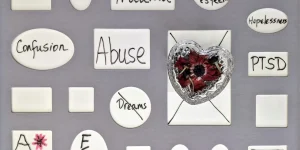5 Ways to Help Someone with Substance Use
Category: Substance Use & Behavioral Recovery
It’s no secret the United States has been struggling with a substance use epidemic for decades. According to the Centers of Disease Control and Prevention, over 70% of the deaths in 2019 were related to drug use.
The chances are probably high that we know someone struggling with a Substance Use Disorder (SUD). It may be a family member, friend, or coworker. If you have a friend or relative who is living with SUD, you might be wondering how you can help. It’s not always easy to make the decision to provide substance recovery help or help with another type of unhealthy behavioral habit. However, your loved one will often have a greater chance of overcoming SUD with your support.
In this blog, we will explore different strategies you can use to help people struggling with Substance Use Disorder.

Topic Of Discussion
1. Obtain Your Own Support
Being in a relationship with a person who has a SUD can be stressful. It’s important that you accept that what you are going through is difficult and seek support. There are many resources that exist to provide not only those struggling with substance abuse support but their loved ones too.
You might want to consider participating in support groups, for instance, such as Al-Anon or Nar-Anon. Children and teens can get support from Alateen. SAMHSA offers a variety of printable resources designed to provide insight and support for families of individuals with Substance Use Disorder.
When deciding how to help someone with a substance use issue, it’s important to develop stress management strategies. This is an important step in helping your loved one. It also benefits you when working through the stressors you will likely face when helping a friend or family member obtain and receive substance use help.
2. Help Them Find A Treatment That Works
There are a number of different treatment options that can be effective, so it is important to consider the options. Think about which treatment might be best suited to your loved one’s needs and goals.
Depending on the SUD, treatment might involve therapy, medication, support groups, or a combination of all of them. A few options may include:
- Community Reinforcement and Family Training (CRAFT): CRAFT is an evidence-based method for helping families get help for loved ones struggling with substance use. It has replaced traditional interventions as the preferred method of helping people with Substance Use get the help they need, such as therapy.
- Medication: The Food and Drug Administration (FDA) has approved a number of medications—including Vivitrol (naltrexone), Campral (acamprosate), and Suboxone (buprenorphine and naloxone)—that can be effective in the treatment of alcohol dependence and other substance use disorders.
- Cognitive Behavioral Therapy (CBT): Substance use therapy that utilizes CBT focuses on helping people understand how their beliefs and feelings influence their behaviors. It works by helping people change the thought and behavior patterns that contribute to substance use.
- Support groups: Twelve-step and peer support groups can also be helpful during the recovery process. These groups are promote sobriety and may take a variety of approaches. Some promote total abstinence, while others focus on moderation. Many of these offer in-person meetings, but online support groups are also available.
Other important factors that can affect a person’s recovery are family involvement and other social supports. SAMHSA suggests that family therapy is an important part of an effective recovery plan.
3. Establish Trust
If your loved one has already betrayed your trust, regaining and maintaining it can be tough. However, establishing trust both ways is an important in helping someone with SUD think about change.
Trust is easily broken, even when you are trying to help. Here are a few things to keep in mind as you are thinking about talking to your loved one about their substance use.
- Different perspectives: While you may only want to help your loved one, they might think you are trying to control them. These feelings can lead a person with SUD to engage in substance use even more. Try to avoid nagging, criticizing, and lecturing.
- Stress can make things worse: Your loved one may use their addictive behavior as a way to manage stress. If the atmosphere between the two of you is stressful, they may turn to their substance use behavior more, not less. Be sure to avoid any yelling, name-calling, and exaggerating.
- Trust goes both ways: Building trust is a two-way process. Trust is not established when you continue to put up with unwanted behavior.
- Understand the role of consequences: People with SUD rarely change until the behavior begins to have consequences. While you might want to protect your loved one, resist the urge to try to protect someone with Substance Use Disorder from the consequences of their actions. The exception to allowing for consequences is if your loved one is doing something that could be harmful to themselves or others—for example, drinking and driving.
4. Communicate
You might be eager and ready to let your loved one know how you feel about the issues their substance use has caused and feel a strong urge to get them to change. Having an effective conversation involves learning how to communicate with someone who has SUD.
While it can be frustrating, remember that the decision to change is theirs. A person with a Substance Use Disorder is much more likely to be open to thinking about change if you communicate honestly and without being threatening.
Communication techniques that can help your conversation be effective may include:
- Using “I” statements: Try to let them know how you feel by using “I” language versus placing blame by using “you” statements. Example: “I get sad when you use [insert substance here]” instead of “You never consider what you’re doing to me when you use [insert substance here]”. By doing using “I” statements, we decrease blame and confrontation.
- Turning negative statements into positives: By turning negative statements into positives, you can reduce the likelihood your loved one will feel attacked and get defensive. Example: replacing “You are such a jerk when you’re high” with “I really enjoy your company when you’re sober”.
- Providing empathy: Individuals with an Substance Use may often feel alone and like no one understand what they are going through. Providing empathy can assist with this. Example: “I can tell that your substance use frustrates you, and that must be hard to deal with sometimes.”
- Letting them know that you want to be part of the solution: Providing an individual with the opportunity to seek help without having to worry about other things can be a huge support. Example: “I’d be glad to take care of the kids while you get substance abuse help.”
It’s important to pay attention to your non-verbal communication. If your body language or facial expressions are seen as negative, it may be more difficult for your loved one to view your concern as genuine or to accept your help.
5. Know What to Expect During Treatment
Once your loved one has decided to begin treatment, it can be helpful to know what to expect. You might wonder how long treatment will last and what will happen during their recovery. The answer depends on a variety of factors including:
- The severity of your loved one’s substance use
- The duration and frequency of their substance or alcohol use
- Past attempts at recovery
- Co-occurring mental health conditions
- Motivation and commitment to recovery
- Support and assistance available
Rehab programs usually last either 30, 60, or 90 days. The National Institute on Drug Abuse (NIDA) recommends that people spend a minimum of 90 days in treatment.
Long-term treatment and recovery may last for months or even years. Overall progress and setbacks during recovery can extend the duration of treatment.
During this time, there are things that you can do to offer support. Learning more about the treatment process and offering help with immediate needs—such as driving your loved one to appointments or attending support group meetings with them—are all ways that you can support their recovery.
Does someone you know struggle with Substance Use? Tri-Star Counseling offers therapy services for those in recovery and in active substance use. Or maybe you need support while watching a loved one go through SUD as you try to help them. Schedule an appointment with us, it would be a privilege to journey along side you or your loved one on the road through recovery.

